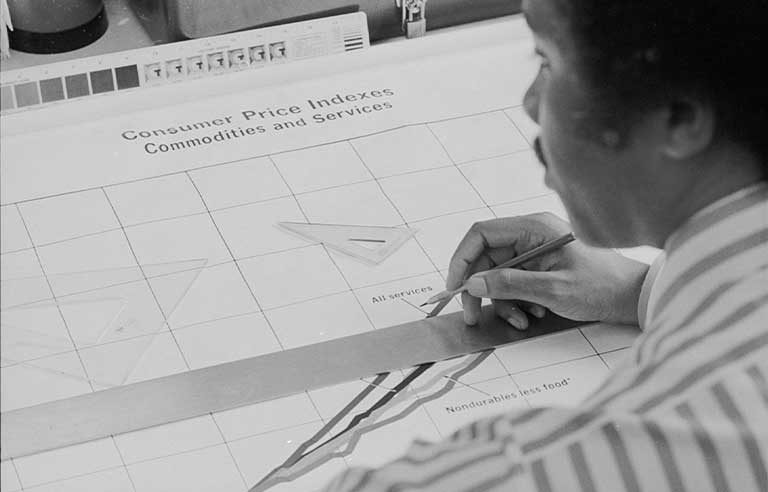
Artist working on a consumer price index chart. Photo: O’Halloran, Thomas J., photographer/ U.S. News & World Report magazine photograph collection (Library of Congress)
Washington — Bureau of Labor Statistics staffers recently rediscovered a popular adage while searching through archives for the agency’s 140th anniversary: The more things change, the more they stay the same.
That’s evident in a 1908 research paper highlighted by BLS employee Melissa Pollock in a recent blog post. In the literature, George M. Kober outlined a case for U.S. researchers to “study, monitor, and prevent industrial accidents and diseases.” Kober called for special attention to exposure to dust, toxic substances and unsanitary environments.
Sound familiar?
Kober further recommended regular medical exams to screen for early signs of work-related disease, as well as “government intervention to establish protective guidelines,” among other protections for which the occupational safety community still advocates.
Of course, some topics are no longer an issue. For instance, phosphorous necrosis of the jaw – also known as “phossy jaw” – often beset workers in match factories, with several cases triggering jaw removal or even death. No more.
However, a Frederick L. Hoffman paper, “The Mortality from Consumption in Dusty Trades,” covers deaths related to what today is known as tuberculosis. The analysis from the early 20th century arguably resembles a pattern evident in modern respiratory diseases related to on-the-job exposure.
As the blog post points out, consumption “was not a disease that affects the worker immediately, but slowly over many years. This made it difficult for workers to connect the symptoms of their illness with the job they may have been doing for most of their life.”
A bill signed into law by President Chester A. Arthur established BLS in June 1884. The agency initially was part of the Department of the Interior. After various shuffling, it was transferred to the Department of Labor in March 1913.
McCraren Compliance offers a full range of safety and health training and consulting services. Plus we can help you incorporate well-being into your traditional systems in order to support the Total Worker Health of your workforce.
Call 888-758-4757, email info@mccrarencompliance.com or visit our website www.mccrarencompliance.com
Original article published by Safety+Health an NSC publication


